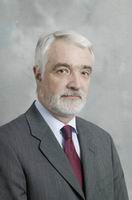- Serbia
Get to know Serbia
- Citizens
Culture and science
Health services
Pension and disability insurance
- Business
Employment
Economy
- Media
- Government
- Contact
Keep in touch
Contact form
Back
Keepin touch
Whether you have a question, comment, suggestion or any problem in the purview of the government, send us your message and we will try to respond as soon as possible. If your problem is not in our purview, we will forward your message to the relevant institution.
Q:
A:
Boosting privatisation and keeping dinar stable
Belgrade,
13 September 2004
Serbian Deputy Prime Minister Miroljub Labus said that the Serbian economy is improving, but that it is necessary to intensify the privatisation process, reduce bank interest rates, increase the efficiency of the judiciary and keep prices stable.
In an interview to the Tanjug news agency, Labus said that the average salary in Serbia has increased 11 percent in relation to September last year and that living standards are better as well.
Labus pointed out that salaries in November and December 2003 were slightly lower than the current average due to revenues from privatisation during the mandate of the former government.
The Deputy Prime Minister said that the Serbian economy is still in a hard position because every second factory in Serbia is unproductive, but he announced that the privatisation process will be intensified through ten large tenders that to be invited by the end of the year, as well as through a larger number of auction sales.
The government is committed to maintain the stability of prices, with a 10 percent maximum rise.
Speaking about the growing trade deficit and negative balance of payment, Labus said that the World Bank looks with disapproval on this situation . He said that the only solution is to boost exports and to credit export operations while maintaining the stability of the dinar.
He said that it is necessary to reduce bank interest rates for crediting payment operations and attract investment for domestic companies which will make export products. The debts of these companies to the state must be written-off so as to facilitate their business operations.
The balance of payment deficit in the first seven months of this year is larger than in the same period last year. The Serbian government is doing its level best to reduce the trade deficit, and it plans to pull in $1.5 million in revenues through trade with Russia alone.
Labus pointed out that salaries in November and December 2003 were slightly lower than the current average due to revenues from privatisation during the mandate of the former government.
The Deputy Prime Minister said that the Serbian economy is still in a hard position because every second factory in Serbia is unproductive, but he announced that the privatisation process will be intensified through ten large tenders that to be invited by the end of the year, as well as through a larger number of auction sales.
The government is committed to maintain the stability of prices, with a 10 percent maximum rise.
Speaking about the growing trade deficit and negative balance of payment, Labus said that the World Bank looks with disapproval on this situation . He said that the only solution is to boost exports and to credit export operations while maintaining the stability of the dinar.
He said that it is necessary to reduce bank interest rates for crediting payment operations and attract investment for domestic companies which will make export products. The debts of these companies to the state must be written-off so as to facilitate their business operations.
The balance of payment deficit in the first seven months of this year is larger than in the same period last year. The Serbian government is doing its level best to reduce the trade deficit, and it plans to pull in $1.5 million in revenues through trade with Russia alone.
-
 Belgrade/Brussels, 19 November 2025
Belgrade/Brussels, 19 November 2025European integration shared responsibility of entire society
-
 Belgrade, 29 October 2024
Belgrade, 29 October 2024State moves to minimise advertising for betting shops
-
 Belgrade/Berlin, 28 January 2016
Belgrade/Berlin, 28 January 2016Fences cannot stop migrations
-
 Belgrade, 7 January 2016
Belgrade, 7 January 2016Serbia to experience dynamic economic growth in 2016
-
 Belgrade, 31 December 2015
Belgrade, 31 December 2015Serbia will persevere on path of development, reforms
-
 Belgrade, 30 December 2015
Belgrade, 30 December 2015Ground for Serbia’s progress set
-
 Belgrade, 28 December 2015
Belgrade, 28 December 2015Serbia ready for improvement of cooperation with Russia
-
 Belgrade, 22 December 2015
Belgrade, 22 December 2015Serbia ready to open six more chapters next year
-
 Belgrade, 21 December 2015
Belgrade, 21 December 2015Serbia to be part of EU by 2020
-
 Belgrade, 20 December 2015
Belgrade, 20 December 2015Serbia ready for EU membership by 2019

